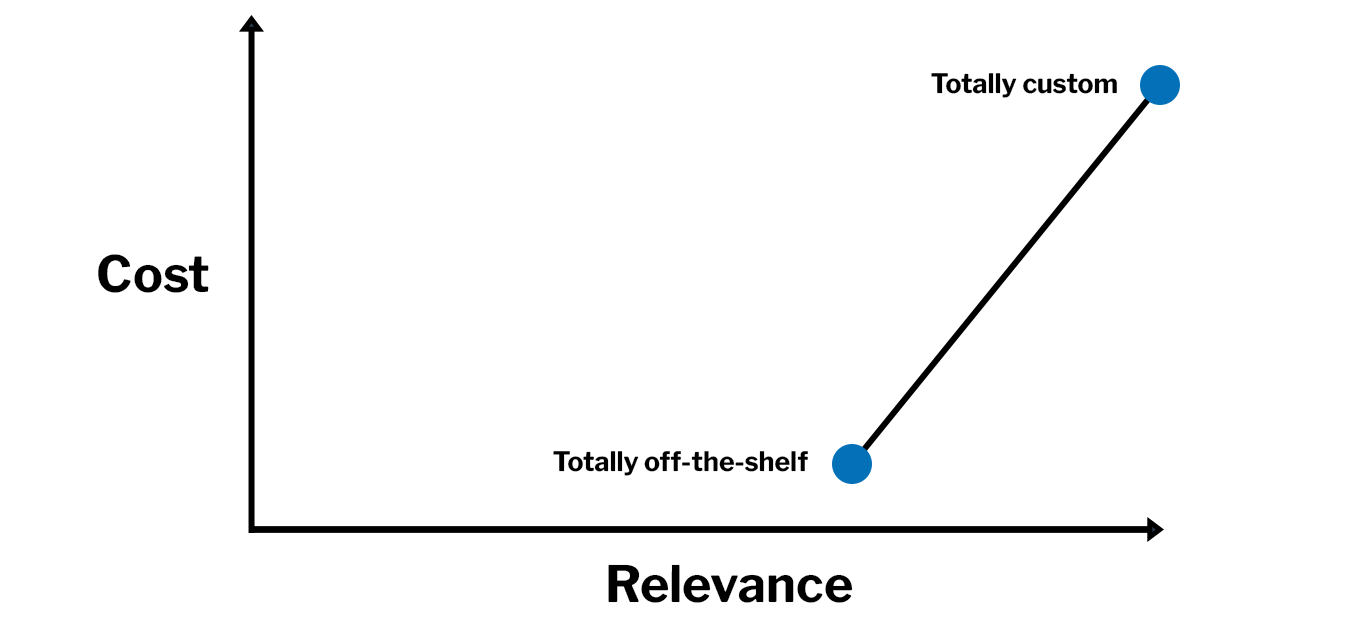Is your personalized learning worth the investment?
Choosing between off-the-shelf and custom solutions.
In case you missed it, last week’s episode of The Mind Tools L&D Podcast was fantastic. And don’t let the title fool you. ‘The future of e-learning interfaces’ might sound drab, but our guest Ben Betts - former CEO of Learning Pool - covered the evolution of the LMS, the interaction between consumer and enterprise products, and the future direction of learning at work.
And I wasn’t on it, so I’m allowed to say it was great.
Here’s just one snippet from Ben that jumped out at me:
‘The draw has always been to make things more special, more unique, more personalized, more “how we do things around here”. And I think, perhaps, part of that is that people don't recognize the penalty they're imposing on themselves when they do that. Like, do you need to invest another £30,000 quid in a [custom management program] or can you use Mindtools?’
Let’s unpack that a bit.
🧔🏽 The trend toward personalization
There is an ongoing trend across every aspect of our digital lives for increased personalization.
The Netflix algorithm, your Facebook feed, your media consumption, all tailored to your individual preferences. That includes both your stated preferences (like when you say you’re interested in science news) and your revealed preferences (like when you consistently ignore science news in favor of cat gifs).
This works in the consumer space because the datasets are massive. Either there’s an enormous volume of content (think Instagram), or an enormous volume of users (think Netflix). The most successful consumer platforms have both, then use an algorithm to optimize the user experience.
In the corporate world though, you usually have neither.
🏢 Why is enterprise different?
Even if you have 100,000 employees, that doesn’t compare to the 283 million paying customers that Netflix has.
Even if you have 100,000 courses on your LMS or LXP, that doesn’t compare to the 14 billion videos on YouTube.
This matters because scale drives down cost. Personalizing any user experience for a million people is cheaper, on a per-person basis, than personalizing an experience for 100.
AI tools make personalization easier but, without scale, results often fall short.
That’s why, in our podcast last week, Ben asked listeners to think about whether they could give up some degree of personalization to use a generic leadership and management solution (like Mindtools).
Where ‘generic’, in this case, means: ‘broadly applicable to all managers, no matter their industry or specialism, factoring in an in-depth review of the research base, and optimized based on the behavior of millions of Mindtools users’.
💸 How to think about relevance vs cost
As I was listening to the discussion, I began to picture this graph:
On the x-axis, we have Relevance: How useful and applicable is any learning intervention to the person who experiences it?
On the y-axis, we have cost: How much does it cost to provide that learning intervention to that person?
A well-designed off-the-shelf product should be broadly relevant to the target audience. A custom solution will be even moreso.
But Custom is also more expensive.
The question then becomes, what is the increased relevance worth?
Or, is the value of ‘a’ (below) worth the increased cost of ‘b’?
🛠️ How we build our off-the-shelf solutions for managers
Regular readers will know that we’ve been writing about our ‘Building Better Managers’ report for some time. This report introduces the 12 key skills that all managers need, no matter their context, to improve individual, team and organizational performance.
The findings are based on an in-depth review of the academic literature, interviews with both managers and L&D leaders, and a survey of over 2,000 people.
We’ve then taken the results and created:
✅ a Manager Skills Assessment, to help managers identify where they need to develop;
📈 a suite of adaptive courses, our Manager Skill Builder, which provides every user with a unique path to proficiency (personalized, within the context of these 12 skills);
💡 and new performance support resources in our Content Hub, aligned to our skills framework and surfaced by our AI chatbot.
🎨 Layering on personalization
When we talk to clients and prospects about these products, we usually get asked about our ability to customize them. After all, ‘my organization is different’.
It is.
Of course it is.
But how different is it?
I’ve worked on the Mind Tools Custom team for over 10 years, so I’m a big proponent of custom solutions. But I think the graph above is a nice way of thinking about the trade-off inherent in choosing between:
An off-the-shelf solution that is low cost and broadly applicable to everyone, and
A custom solution that is higher cost and far more tailored to your unique audience needs.
The answer, for most organizations, is likely somewhere inbetween: taking advantage of the insights, testing and product development that has gone into off-the-shelf solutions, but layering on custom webinars, workshops, branding or scenarios to help connect those solutions with your organizational context.
If you’re responsible for management development, we’d love to speak with you. Get in touch by emailing custom@mindtools.com or just reply to this newsletter from your inbox to find out how we can help.
🎧 On the podcast
The podcast I referenced above is available now, and based on Ben Betts’s blog post: What’s the Next Generation of E-Learning Interfaces?
During the discussion, Ben spoke to Ross D and Owen about:
the many eras of the LMS, and how we got to where we are now;
the forces that have shaped e-learning interfaces over time;
how AI and other changes in the tech landscape might usher in a new era.
Check out the episode below. 👇
📖 Deep dive
Ross D and I just recorded a podcast with Gary Cookson, author of Making Hybrid Working Work, a new book to be released in early January.
During the discussion, we explored the concept of ‘context-dependent memory’.
This describes the phenomenon where you walk to the kitchen to get something, but then can’t remember what it was you were looking for. When you return to where you originally had the thought, you suddenly remember.
Writing in Simply Psychology, Saul McLeod explains:
‘Reinstating the internal state or external context makes recall easier by providing relevant information, while retrieval failure occurs when appropriate cues are not present.’
This came up during the discussion with Gary because we were exploring how best to develop managers who work primarily in hybrid or remote settings.
If you’re responsible for developing remote managers, context-dependent memory suggests it would make sense to provide training in a remote setting (via virtual classroom or asyncronous shared spaces like Miro).
If you work with hybrid managers, you might want to create a blended approach where participants are prompted to think consciously about the benefits of being together online vs being in the same physical location.
McLeod, S. (2023). Context and state-dependent memory. Simply Psychology.
👹 Missing links
🏚️ Don’t be too hard on the designer who is paying for their house
There’s a trend in our industry to give each other a kicking. I’ll confess, I’ve done it. But, as speaker and writer David Kelly argues, we shouldn’t be too hard on the learning designer who is trying to pay their mortgage. Yes, that course or workshop that we see and critique might not be perfect, but we should remember that the instructional designer can only push back so many times before they put their job at risk.
Many readers will know that there’s historically been a very active L&D community on the-platform-formerly-known-as-Twitter. If it’s looking a little quiet there now, or if you’ve never been involved before, it’s because everyone has moved to Bluesky. While Bluesky has been around for a few years, it’s seen a surge in users following recent changes to the X algorithm. If you want to connect with me there, I’m @RossGarnerMT.
2025 will be the year when we all ditch our phones and start to connect in person again. That’s the take of Rachel Botsman (no pun intended), writing in Wired. For Botsman, the rising popularity of vinyl, polaroids and boardgames, and decrease in popularity of dating apps, suggests a shift away from ‘connectivity, apps, and algorithms’. This is, writes Botsman: ‘anemoia, the nostalgia for a time or a place one has never known’.
👋 And finally…
Pity the manager. They’re doing their best to lead their teams while implementing organizational strategy, and then they stumble across this on their Instagram feed.
It’s a hard gig.
👍 Thanks!
Thanks for reading The L&D Dispatch from Mindtools! If you’d like to speak to us, work with us, or make a suggestion, you can email custom@mindtools.com.
Or just hit reply to this email!
Hey here’s a thing! If you’ve reached all the way to the end of this newsletter, then you must really love it!
Why not share that love by hitting the button below, or just forward it to a friend?





